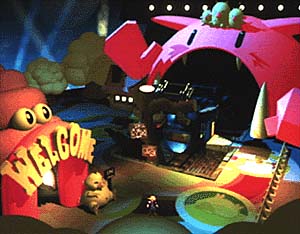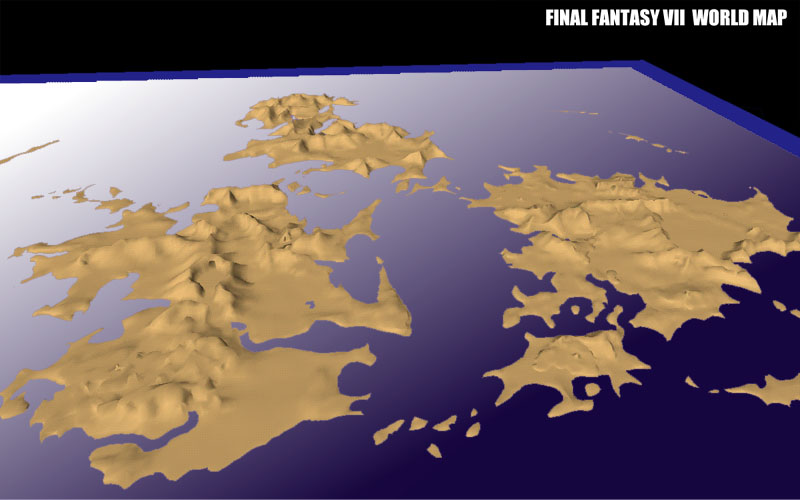 |
Final Fantasy VII - Retroview |
 |
If You Fail, You Can Always Hit the Reset Button!
By: Stewart Bishop
| Review Breakdown |
| Battle System |
9 |
| Interface |
7 |
| Music/Sound |
9 |
| Originality |
7 |
| Plot |
6 |
| Localization |
5 |
| Replay Value |
7 |
| Visuals |
8 |
| Difficulty |
Easy |
| Time to Complete |
25 - 50 Hours
|
|
| Overall |
 |
| Criteria
|
Squaresoft's titanic hit, Final Fantasy VII stormed into the scene after the series' dormancy for the past few years, with eager fans ready to receive the mammoth game that would forever change the way we think about RPGs. Its futuristic environment was certainly astray from the previous titles in the series. FMVs galore; the epic adventure spanned three CDs and for once, TV advertisements abounded, which is a rare feat in my eyes. To this day the only RPGs I can recall that had TV based advertising are Final Fantasy VII, Ocarina of Time, Legend of Mana, Legend of Dragoon and Chrono Cross.
Final Fantasy VII's battle system is a souped of version of classic RPGs; you may attack, cast spells, defend, use an item, summon a creature or change from the front and back rows. The unique element in Final Fantasy VII is the Materia System, a very elegant system in my own opinion. Materia serve as your magic, summons and other abilities which can be used to strengthen your character or add effects to your weapons. There are different types of materias, which are Independent, Support, Command, Magic and Summon, all colored differently. Equipping them is a simple enough task, you are taken through menus and decide how to distribute materia amongst your party members, just like equipment. The amount of materia that a character can equip is dependent on the weapon and armor that he or she is using. Materia slots come in two flavors, single or linked. Support Materia is the only Materia that uses the linked version, since it enhances the effects of the Materia that it is linked with, so if you put an 'Elemental' Materia linked with 'Fire' Materia in your Weapon, your weapon is given an extra fire element to the attack. Independent Materia is Materia used by itself, that can be used to alter statistics (such as HP Ups) or to help you in battle (Cover Materia lets you take damage for allies). Command Materias add extra commands to your basic list of 'Attack, Magic, Summon and Item,' such as the Steal Materia will enable the command Steal so you can swipe a few things from opponents. Magic Materia serves as magic; You can only cast spells if you have the correct Materia. Lastly, Summon Materia allows you to summon a certain creature, such as Ifrit or Shiva. The final segment of the battle system is the Limit Break system. As your character takes damage, a meter begins to fill; this is carried over battles or emptied if the character dies. When this meter is full, your Attack is replaced with a flashing "Limit." You may use a limit break at the expense of the meter. As you progress through the game, you will receive more powerful Limit Breaks and will be able to select which level of power you would like to use. Note that the higher the Limit Break level, the longer it will take to charge your meter. The effects range from full healing, to monstrous damage to complete invincibility for a limited amount of time.
As for the interface, it's very solid. The menus are traversed at a good speed, and there isn't much slowdown. The problem is that the rendered backgrounds make it very difficult to find the correct path that you should be following, and sometimes it's hard to figure out what direction you'll be going when you press 'up', especially since the camera seems to have a mind (or lack thereof) of its own and often switches to absurd angles. It also gets mildly annoying having to hold down a button to keep running; since I tend to play games while on the computer and typing, I would have appreciated being able to run with the control pad while typing with my right hand. Oh woe is me. No real problems here, though. Another gripe is switching materia and equipment between characters. Unless two characters have the same number of slots in both weapon and armor, it will be quite annoying swapping materia since you have to do it one by one. By the by, you don't leave the intro city until halfway through the first disc.

|
| And the Heroes of the Planet Faced the Perilous Cotton Candy and Roller Coaster Rides...
|
|
I love the music to this game, it's incredible. From the battle theme, the boss theme, Aeris' theme, Jenova, it's all a very good collection of songs ranging from slow piano songs to fast paced techno beats. It's interesting that they have so many versions of the main theme, too, and how at least the overworld theme music changes with the game, so you aren't stuck with a song that isn't so hot; Final Fantasy VIII comes to mind. While not exactly on par with the likes of Final Fantasy VI, I believe it's the second best soundtrack of the series. The usual Squaresoft whistles and chimes are there, but who cannot say that they don't love the enemy death sounds, or the crisp effects of a Limit Break as it revs up?
Being the first Final Fantasy to be released in CD format, the first Final Fantasy to use full motion video, the first Final Fantasy placed in a futuristic world and containing an all new magic system, Final Fantasy VII has many unique elements that make it original, while still keeping in touch with the basic fundamentals that keep the game 'classic.' Of course, it also has the Golden Saucer and oodles full of new mini-games that Square is well-known for.
The plot itself was a very good one, I enjoyed it more than I did many other RPGs. It had some twists, good character development, incredible villains and a few humorous moments. I believe, however, that the poor translation really hurt it, and the whole cliffhanger ending wasn't too good of an idea. Even today, there are many people who are still trying to figure out what on earth happened in the end. It leaves far too much for the imagination; Using your imagination is good sometimes, but this abrupt ending makes it feel incomplete and rushed.
As said before, the translation really hurt the game's plot, but at least Square tried out a few new things; everyone starts swearing, Barret has an accent that angered a select proportion of the population and of course, a few suggestive things, "I'll smash em," "I'll rip em off," and the like. On terms of the swearing, though, it was probably only because back in the day, the censors would pale at the sight of the word "damn." Nowadays, however, practically anything goes, so they just had to abuse their newfound freedom. You'll notice that in Final Fantasy VIII, they tone it down a bit; You'll see more casual swearing and a lot less numpad symbols. Decent translation job at most, but an admirable effort.

|
| Yeah, Too Bad the Polygons Won't Ever Be This Smooth in the Game |
|
Final Fantasy VII has quite a number of sidequests at its disposal, not to mention the extra two bosses at the end that aren't exactly big pushovers (at least, not without the right tools...). With the Golden Saucer mini-games, Chocobo Racing, Chocobo Raising and 'extra' characters, there's a lot to come back to after you've already beaten it, which is good since the game doesn't take very long to finish (I'd estimate about 35 hours on average the first time). Also, starting a game is always an enjoyable experience, at least the first hour or two of it, since it brings back so many fond memories. Unfortunately, it doesn't hold its grip very long and I often find memory cards stacked with incomplete FF7 games around the house.
Visually, Final Fantasy VII is very good, but not without its flaws. While the rendered backgrounds were beautiful, the character models were just...terrible. They were out of proportion, had no faces and were covered by some very bland skins. I would have preferred that they used the models that were in the battle scenes, at least they look more realistic. The Summons were also a sight to behold, but many still had very 'boxed' polygons like Titan. The FMV sequences, however, are superb and can still rival the quality of the CG of today.
Final Fantasy VII was a the full conversion from medieval to futuristic. Final Fantasy VI brought us halfway there, but the low-level technology was nothing compared to the gadgets and gizmos in Final Fantasy VII. It introduced many new elements to the series while still keeping the classic feel. Final Fantasy greatly increased the number of dedicated RPGamers that year; it appealed to new audiences with its captivating FMVs while still remaining a highly anticipated title in the eyes of the current RPG players. Final Fantasy VII is definitely one of the better titles in the series and should not be missed by anyone who has taken the slightest interest in the genre.

|







